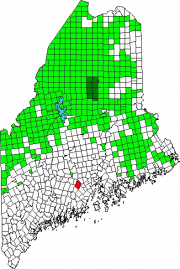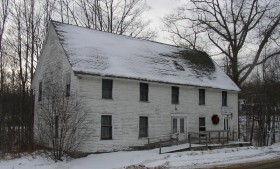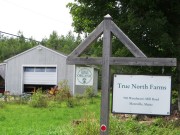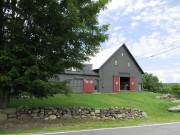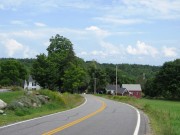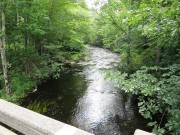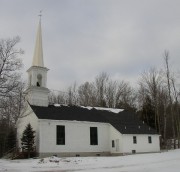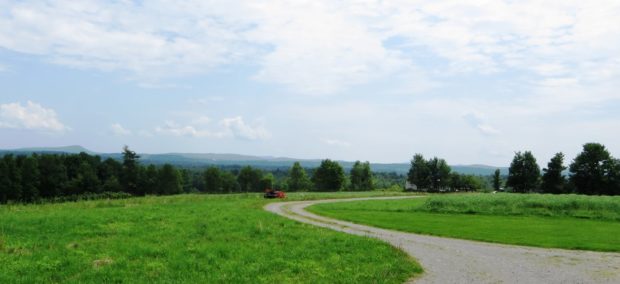
| Year | Population |
|---|---|
| 1970 | 430 |
| 1980 | 631 |
| 1990 | 877 |
| 2000 | 1,002 |
| 2010 | 1,032 |
| Geographic Data | |
|---|---|
| N. Latitude | 46:26:14 |
| W. Longitude | 69:16:51 |
| Maine House | District 96 |
| Maine Senate | District 11 |
| Congress | District 2 |
| Area sq. mi. | (total) 38.3 |
| Area sq. mi. | (land) 38.2 |
| Population/sq.mi. | (land) 27.0 |
County: Waldo
Total=land+water; Land=land only |
|
[MONT-vil] is a town in Waldo County, settled in 1780 and incorporated on February 18, 1807 from Davistown Plantation.
South Montville was home in the mid-19th century to state legislator, then U.S. Representative Ebenezer Knowlton. U.S. Representative Seth L. Milliken was born in here on December 12, 1831.
In the 1880’s, when the population was 1,255, Montville hosted five sawmills, one grist mill, two cheese factories, two carriage factories, and fifteen public schoolhouses.
The Georges River Grange, No. 118, no longer used for that purpose, has been used by the Town for community events, but was for sale in 2014.
The town was the initial location for the historic Haystack Mountain School of Crafts in 1950. When a state road was poised to split the campus, it relocated to Deer Isle and in 2005 was placed on the National Register of Historic Places.
The town seems a series of “corners” villages on Maine Route 220 from north to south: Poland’s, Bean’s, White’s, McFarland’s, and Clark’s. South Montville village, on Route 173, is the site of the old grange hall, a church, farms and Trues Pond, the source of the St. George River.
The Frye Mountain Wildlife Management Area is in the northeast corner of the town near Poland’s Corner village, shared with the town of Knox. The Area includes Spears Mountain, and Marsh Stream. It offers fur trapping, hunting, fishing, and opportunity for observing deer in off season. This growing community is easily linked to Belfast and Augusta via Maine Rt 3.
National Register of Historic Places – Listings
Photos, and edited text are from nominations to the National Register of Historic Places researched by Maine. Historic Preservation Commission.
Full text and photos are at https://npgallery.nps.gov/nrhp
Knowlton, Ebenezer, House
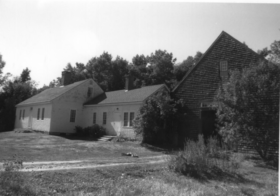 [Choate Road] The Ebenezer Knowlton house is a modest, center chimney, shingled capestyle with attached barn in South Montville. Montville was settled between 1778-1779. Industry then revolved around sawmills built on the narrow rivers flowing between a series of ponds. The Ebenezer Knowlton house was built by Elder Ebenezer Knowlton starting at least by 1828, but possibly earlier. The complex contains two New England barns and the interior contains superb Federal features. Throughout the next century the structure’s form and fashion was modified to enhance and reflect the economic and social activities of the Knowlton Family.
[Choate Road] The Ebenezer Knowlton house is a modest, center chimney, shingled capestyle with attached barn in South Montville. Montville was settled between 1778-1779. Industry then revolved around sawmills built on the narrow rivers flowing between a series of ponds. The Ebenezer Knowlton house was built by Elder Ebenezer Knowlton starting at least by 1828, but possibly earlier. The complex contains two New England barns and the interior contains superb Federal features. Throughout the next century the structure’s form and fashion was modified to enhance and reflect the economic and social activities of the Knowlton Family.
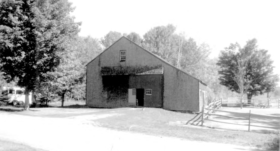 Elder Ebenezer Knowlton was an itinerant minister who found his calling during the Great Awakening of the early 1800s. Born in Pittsfield, New Hampshire in 1782 and married to Abigail True twenty years later, he began preaching shortly thereafter. He was conducting marriage services in South Montville by 1812, however he must have been passing through since he remained listed in the NH census through 1820. In 1827 he, his three sons, wife and daughter moved to South Montville. His wife’s family were large landholders in Montville.
Elder Ebenezer Knowlton was an itinerant minister who found his calling during the Great Awakening of the early 1800s. Born in Pittsfield, New Hampshire in 1782 and married to Abigail True twenty years later, he began preaching shortly thereafter. He was conducting marriage services in South Montville by 1812, however he must have been passing through since he remained listed in the NH census through 1820. In 1827 he, his three sons, wife and daughter moved to South Montville. His wife’s family were large landholders in Montville.
While living in New Hampshire, Knowlton had been a member of the Legislature. Within a year of moving to Montville he was voted to serve the first of many terms in the Maine Legislature. Weeks before he died in 1841, Knowlton and Abigail sold their farm to their sons David, Ebenezer, Jr., and John Colby. When the senior Knowlton moved his family to Montville in 1828 his middle son, Ebenezer Jr., was thirteen; within four years he had a major conversion and also took up the ministry. The younger Ebenezer followed closely in his father’s footsteps. In 1844 he was voted to the first of six terms in the Maine House of Representatives, and served as speaker of the House in 1846.
An ardent abolitionist and supporter of education, Knowlton also served one term as a member of the Thirty-fourth Congress in 1855-1857, before settling again in Montville and resuming his ministry at the Baptist Church. While his connection to Montville remained consistent over the decades, just as he started his political career he sold his interest in the house to his brother John Colby Knowlton.*
Montville Town House
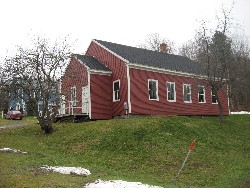 [418 Center Road] The Montville Town House was built in 1827 as the North Ridge Meeting House. It was built to serve the 2nd [Montville] Free Will Baptist Church, organized in 1818. The common building featured box pews and a pulpit situated between the front entrances, a relatively uncommon church arrangement known as a ‘reverse plan’.
[418 Center Road] The Montville Town House was built in 1827 as the North Ridge Meeting House. It was built to serve the 2nd [Montville] Free Will Baptist Church, organized in 1818. The common building featured box pews and a pulpit situated between the front entrances, a relatively uncommon church arrangement known as a ‘reverse plan’.
The function of the building expanded in 1828 when the town of Montville started to use the structure as a town house: the location of public meetings and town business. During the middle of the 19th century the religious function of the building began to diminish, and by the end of the century the property appears to have lost most, if not all of its religious associations.
Remodeled extensively in 1909 and 1910, it’s wide auditorium is the location of town meetings and polling, and the corner room was the Selectmen’s office.
 Congressional Medal of Honor winner:
Congressional Medal of Honor winner:
JOHN D. TERRY
Form of Government: Town Meeting-Select Board-Administrative Assistant.
Additional resources
A Brief History of the Town of Montville. Halldale School. 1947.
Donahue, Tom. The Kingdom in Montville, Maine: A Technological Diary 1789-1994. Freedom, Me. T. Donahue. 1995. (Belfast, Me. County Copy Center) [University of Maine, Raymond H. Fogler Library, Special Collections; Maine State Library]
McFarland, Aaron P. Daybooks, 1850-1868. (Cataloger Note: Daybooks from an unidentified business belonging to Aaron P. McFarland in Montville, Maine, probably a general store. Volumes list names of customers, items purchased and amounts paid. Typical listings include tea, candles, thread, calico, eggs, etc.) [University of Maine, Raymond H. Fogler Library, Special Collections]
*Maine. Historic Preservation Commission. Augusta, Me. Text and photos from National Register of Historic Places.
Varney, George J. A Gazetteer of the State of Maine. 1886. pp. 372-373.


